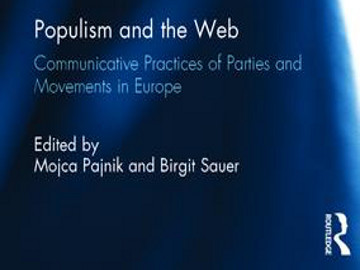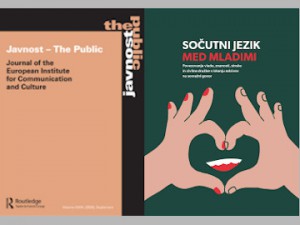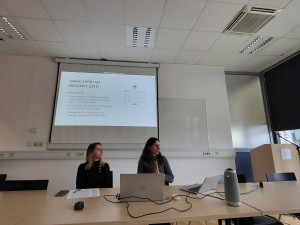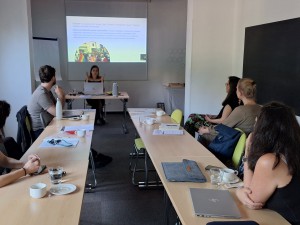Populism and the Web: Communicative Practices of Parties and Movements in Europe

 Pri založbi Routledge je izšla nova knjiga o vlogi spleta v komunikacijskih strategijah desnih populističnih strank in gibanj v Evropi. Knjigo sta uredili Mojca Pajnik in Birgit Sauer.
Pri založbi Routledge je izšla nova knjiga o vlogi spleta v komunikacijskih strategijah desnih populističnih strank in gibanj v Evropi. Knjigo sta uredili Mojca Pajnik in Birgit Sauer.
Opis knjige
Politične stranke in gibanja vse bolj uporabljajo splet za promocijo idej, širjenje ideologij, za mobilizacijo, kot tudi v volilnih kampanjah za pridobivanje podpore volivcev. Knjiga preučuje vlogo spleta v komunikacijskih strategijah desnih populističnih strank in gibanj v Evropi. V ospredju je analiza diskurza in praks spletnega komuniciranja, ki se jih politični akterji poslužujejo za širjenje idej, mobilizacijo volivcev in volivk in za konstrukcijo migrantov in migrantk, oseb islamske veroizpovedi in LGBT skupnosti kot “drugih in drugačnih”. Prispevki avtorjev in avtoric v knjigi pokažejo na strategije mainstream političnih strank, na “internetni populizem” in analizirajo prakse progresivnih gibanj, ki se upirajo izključevanju. Poglavja obravnavajo različne topike v primerjalni perspektivi več držav, ob upoštevanju specifik nacionalnega konteksta.
Recenziji
“This excellent book links the origins of contemporary populism to the erosion of democratic institutions, and shows how the rise of populist parties on the radical right further threatens democracy across Europe. A common theoretical and empirical framework gives the book a rare unity of argument and analysis seldom found in edited volumes. The focus on how these parties use digital and social media to communicate directly with large publics helps explain the rapid rise of the radical right in so many democracies. This book is a must read for everyone concerned about the disruption of communication and political institutions in contemporary democracies.” – Lance Bennett, University of Washington
“Drawing on insights from a great variety of European countries this book provides a comprehensive yet detailed account of populist discourses and practices in online media. Given the centrality of online communication in current mediatized democracies, the volume is a much-needed addition to the literature on media and populism and among the very first to provide a systematic account of how populist parties and movements make use of the web. The contributions range from comparative analysis with a focus on the participatory potentials of online communication to detailed depictions of different exclusionary discourses. The book ends with an important chapter on strategies to counter populist discourses. On the whole the volume is an indispensable read for any scholar working on the intersection of media and populism.” – Hajo Boomgaarden, University of Vienna
Iz uvoda Gianpietra Mazzolenija:
“This book, collecting a number of insightful studies on many facets of the populist phenomenology from the perspective of the new media, is an outstanding example of the renewed scholarly effort. I think this is a major step forward in understanding populist dynamics beyond the domain of established mass media. Interactive media provide a crucial tool to populists to bypass the gatekeeping of the traditional news media, allowing them to address citizens directly, to mobilize public opinion, to set the agenda of large portions of the citizenry and of the mainstream media themselves. ”
Iz uvoda Ruth Wodak:
“The volume explores a most important and ambitious question asked by many journalists, scholars, politicians, spin doctors, and laypeople alike: Is it at all possible to distinguish between the democratic and participatory use of the Internet and its abuse/misuse due to the spreading of discrimination and hate? Thus, the chapters in this book investigate both hate speech and counter discourses, that is, strategies that challenge right-wing and radical-right populist exclusionary rhetoric and provide possibilities of online emancipatory mobilization against hate speech online.”
Foreword: Populism is better Understood in its Relation with the Media
Gianpietro Mazzoleni
Introductory Remarks From ‘Hate Speech’ to ‘Hate Tweets’
Ruth Wodak
Populism and the Web: An Introduction to the Book
Mojca Pajnik, Birgit Sauer
Poglavje 1
Post-Democracy, Party Politics and Right-Wing Populist Communication
Birgit Sauer, Anna Krasteva, Aino Saarinen
Poglavje 2
Populist Political Communication in Mediatized Society
Mojca Pajnik, Susi Meret
Poglavje 3
Right-wing Populist Convergences and Spillovers in Hybrid Media Systems
Iztok Šori, Vanya Ivanova
Poglavje 4
Media, Politics and Democracy: Populist and Post-populist Europe in the Mirror of the Italian Experience
Giovanna Campani
Poglavje 5
From Anti-Europeanism to Welfare Nationalism: Populist Strategies on the Web
Ildiko Otova and Heini Puurunen
Poglavje 6
Anti-Migration and Islamophobia: Web Populism and Targeting the “Easiest Other”
Denitza Kamenova and Etienne Pingaud
Poglavje 7
Perceptions of Gender: the Discourse of the Far Right on the Web
Gabriella Lazaridis and Vasiliki Tsagkroni
Poglavje 8
Sexuality Online – the Construction of Right-Wing Populists’ “Internal Others” in the Web
Roman Kuhar and Edma Ajanović
Poglavje 9
Media Populism in Post-democracy: the Crossroads of Right and Left Political Parties
Birgit Sauer, Mojca Pajnik, Susi Meret
Poglavje 10
Countering Populist Othering Online: Strategies of Anti-racist Movements
Kaarina Aitamurto and Evelina Staikova




